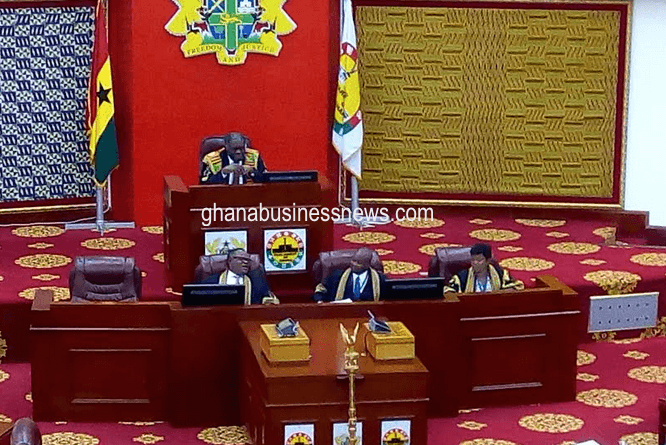Parliament ratifies treaty on establishment of Abidjan-Lagos corridor
 Parliament on Friday ratified the Treaty on the Establishment of the Abidjan-Lagos Corridor to integrate the participating countries’ economies and ensure ease of movement and transportation across their borders.
Parliament on Friday ratified the Treaty on the Establishment of the Abidjan-Lagos Corridor to integrate the participating countries’ economies and ensure ease of movement and transportation across their borders.
The treaty was signed by, and among the Presidents of the Governments of the Republics of Benin, Cote d’Ivoire, Ghana, the Federal Republic of Nigeria and the Togolese Republic in 2014.
Having met on the day of the ratification, June 30, 2017, the Committee on Roads and Transport, to which the Speaker had made a referral of the treaty for consideration and report on Tuesday, June 27, 2014, noted that participating countries were to ratify the treaty by June 30, 2017.
The implementation of the Treaty will improve the 1028 km stretch of road from Abidjan- Lagos (Abidjan-Accra- Lome- Cotonou-Lagos) which also links some of the economically dynamic cities in Africa, and serves a catchment area for over 35 million people.
The Committee recognised that informal border trade was the main bane of traffic that was predominant within the corridor stretch and at least two thirds of the total traffic had and origin/ destination route, to and from neighbouring countries based on the movement of passengers and goods.
Further, the corridor provided a global gateway to coastal and landlocked countries in West Africa. All the landlocked countries used at least one port along the Abidjan- Lagos Corridor.
According to the Committee, a total of $22.720 million has been secured for the feasibility study of the projects.
Also, Ghana has secured a loan of UA 1 million from the African Development Fund (AfDB) under this programme, but is however yet to execute the loan agreement with the ADF for the study.
The Committee said the ratification of the Treaty would advance the cause of securing the loan.
Furthermore, Ghana after ratifying the Treaty stood to secure grants and more add-ons from the African Development Bank and that current proposals for development of other sections of the N1 (Highway) are for a two lane dual carriageway.
Subsequent to the signing of the treaty, all current and future developments of the remaining sections of the N 1 would require right of way to accommodate the proposed three-lane dual carriageway.
Mr Kwabena Owusu Aduomi, Deputy Minister, of Roads and Highways and Chairman of Committee, reading the report, told the House that the Treaty sets out to transform the Corridor into a development corridor that will offer a competitive transport and transit services that will secure regional trade, stimulate investment, encourage sustainable development and guarantee security along the corridor.
Four Presidents of the West Africa sub-region, the Presidents of Ghana, Nigeria, Cote d’Ivoire and Togo and Minister of Foreign Affairs of Benin, at the 42nd Ordinary Session of the Authority of Heads of State and Government on February 28, 2013, in Yamoussoukro, Cote d’Ivoire to the construction of a homogeneous highways from Lagos to Abidjan.
The corridor would facilitate more than 75 per cent of the trade volume in the sub-region and several interventions had been undertaken over the year by the development partners and ECOWAS countries through infrastructure movements, restructuring of border posts and soft transport facilitation intervention all aimed at improving and ensuring the free flow of goods, persons and transport.
On April 22, 2013, a meeting of the Ministers of Infrastructure, Works, Finance, Transport and Justice of the five concerned member states met in Abuja and worked out the modalities for the construction of a three-lane dual carriageway (six lanes) highway on the corridor.
A follow-up consultative meeting was held in which the Presidents of the five concerned countries were presented with the outcome of the Abuja meeting which they considered recommendations of the meeting and directed the ECOWAS Commission to work out details of the design studies, works and Supervision Contracts Procurement Plan, Legal Framework, Instructional Arrangements and Financing Options for the implementation of the Abidjan- Lagos Highway Development Projects.
The Roads and Transport Committee also reported that to support the ECOWAS Commission to undertake the activities envisaged under the Abidjan- Lagos Highway project, a Ministerial Committee was to be set up to bring the project to fruition.
On March 29, 2014, in Yamoussoukro, La Cote d’Ivoire, the Heads of State and Governments of the five concerned countries finally signed the Treaty on the establishment on the Abidjan-Lagos Corridor, committing the five nations to the implementation of the project.
Source: GNA
